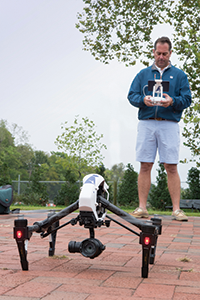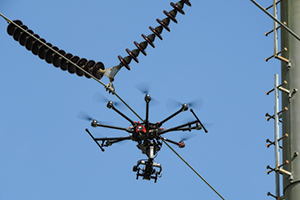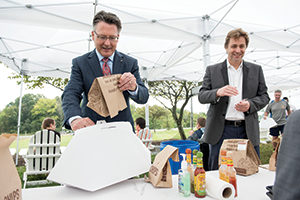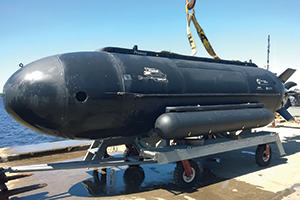On a foggy October morning, gray haze draped over Richmond’s skyline, providing an alluring landscape for aerial photographer Daryl Watkins.
The rumbling of a distant train grabbed his attention as Watkins prepared to fly his drone from Great Shiplock Park in the city’s East End.
 Snapping a new battery into his six-pound drone, a DJI Inspire Pro equipped with a high-tech camera, Watkins picked up the remote control. Within seconds, the drone was traveling 40 miles per hour above the elevated railroad tracks, to capture photos of the approaching Amtrak train. “The top speed of this drone is 50 miles per hour,” says Watkins. “Speed is important for getting out to where you want to shoot from because the battery life is about 15 minutes.”
Snapping a new battery into his six-pound drone, a DJI Inspire Pro equipped with a high-tech camera, Watkins picked up the remote control. Within seconds, the drone was traveling 40 miles per hour above the elevated railroad tracks, to capture photos of the approaching Amtrak train. “The top speed of this drone is 50 miles per hour,” says Watkins. “Speed is important for getting out to where you want to shoot from because the battery life is about 15 minutes.”
Watkins is the man behind Creative Dog Media, a Richmond brand known for its striking aerial photographs of Virginia skylines and landmarks. Since he started as a hobbyist three years ago, his Instagram account has grown to more than 20,000 followers.
The social-media following led to commercial opportunities, with Watkins providing aerial photography for clients such as Virginia Tourism Corp., Richmond Region Tourism and Southern Living magazine. In fact, business has been so good that aerial photography has become a growing side business for Watkins, the co-owner of a technology firm.
Until late August, however, he wasn’t flying his own drones for commercial jobs, even though he’d received an exemption from the Federal Aviation Administration (FAA) allowing him to fly for commercial purposes. Because the FAA defined drones as an aircraft, the agency required them to be operated by a pilot for commercial use. “I would get these jobs from [clients] and I’d have to hire a pilot,” he says. “It took away the Daryl Watkins spin and the Daryl Watkins touch.”
It also took a chunk of his revenue from those jobs.
That all changed this summer. The FAA issued long-awaited regulations governing commercial drones — officially known as small unmanned aircraft systems or UAS — weighing less than 55 pounds. Known as Part 107, the rules allow commercial operators, who are at least 16 years of age, to obtain a remote pilot airman certificate to fly drones.
To obtain a certificate, Watkins passed a required aeronautical test, which included questions on subjects ranging from visual sight charts to the definition of frost. He was so eager, in fact, that he took the exam the day after the rules came into effect.
The new rules are expected to spur dramatic growth in the drone industry. In the six weeks after Part 107 came out, 8,975 people had taken the pilot certification test nationwide, and 88 percent had passed.
Virginia officials and a group of businesses interested in the use of unmanned systems say the commonwealth has the attributes to be a leader in this emerging technology — not only in drones but in driverless vehicles and unmanned maritime vehicles. Virginia touts a diverse topography, a large military presence, proximity to Washington, D.C., and ongoing higher-education research on unmanned systems. To create a unified voice for users of unmanned systems in Virginia, industry representatives recently formed a trade association.
The growth in unmanned systems represents nothing less than the next big revolution, says U.S. Sen. Mark Warner. “This is an area where with the right vision and the right execution, we can be the Silicon Valley of unmanned systems,” he says.
For Warner, a co-founder of Nextel Communications, unmanned systems provide the same potential that the cellphone industry did 30 years ago. “If I were to start again, this would have been one of the sectors I would have personally pursued,” says Warner, who played a critical role in securing an FAA test site for drones at Virginia Tech in a partnership with Maryland. “The technology and the desire for people to use these services is going to happen a lot quicker than most people expect.”
The potential uses of unmanned systems seem endless. Today drones inspect power stations and buildings. They create detailed maps. Health systems are looking at using unmanned systems to move medications and other supplies around hospitals. Government agencies are exploring ways to use the technology for chasing storms and to aid in search and rescue missions. For everyday consumers, the industry could bring driverless cars and package delivery by drone.
The birth of an industry
Unmanned aerial systems made a big leap this year with the introduction of the Part 107 rules, providing official guidelines for how companies can use drones.
The new rules could have a major economic impact. A report by Goldman Sachs predicted that the Part 107 rules on drones could generate $82 billion for the U.S. economy and create more than 100,000 jobs in the next 10 years.
Previously, companies interested in flying drones had to apply for permits to operate them. “[Part 107] is the beginning of the commercial drone industry in a formal sense,” says Sean Windle, a lead analyst for IBISWorld, an industry research firm based in Los Angeles. “Prior to the FAA’s ruling, the market operated on a permit-by-permit basis. And obviously, because of that, you had a flood of different businesses that were petitioning or applying for permits, and there was a huge backlog.”
The rules, however, still maintain a certain number of restrictions, including a drone weight limit of 55 pounds and a maximum flight height of 400 feet above ground. The rules also prohibit nighttime operations and flying over people not participating in the commercial activity. Companies may apply for waivers from these restrictions.
The rules also require operators to keep their drones in their line of sight — a restriction that will limit the full-scale use of drones in the marketplace. For example, package delivery by drone wouldn’t be feasible. “There are still a substantial amount of regulations that basically still means there are some roadblocks to full commercial drone integration, but [Part 107] is definitely a major step forward,” says Windle.
Key player in research
Virginia has become a key player in drone research. Much of the research today is focused on how these aerial systems could be flown safely if the FAA lifts these restrictions or changes its regulations.
 Dominion Virginia Power, for example, has received FAA approval to fly drones beyond line of site for some test scenarios. The power company conducted a test with Virginia Tech’s Mid-Atlantic Aviation Partnership in July and provided results to the FAA. The company is planning future tests.
Dominion Virginia Power, for example, has received FAA approval to fly drones beyond line of site for some test scenarios. The power company conducted a test with Virginia Tech’s Mid-Atlantic Aviation Partnership in July and provided results to the FAA. The company is planning future tests.
Dominion is using drones to inspect transmission lines and structures ranging from wooden utility poles to transmission towers that are 200 or even 500 feet high. Drones allow Dominion to make inspections from more angles than it could achieve with a helicopter. Using drones for inspections, however, costs about the same as using helicopters, according to Steve Eisenrauch, manager of electric transmission forestry and line services for Dominion Virginia Power.
Helicopters can easily travel from tower to tower, while line-of-sight rules require employees to travel by car to inspection sites.
Flying a drone beyond an operator’s vision not only would lower the cost of inspection, but also open up a number of possibilities for Dominion. “Something else we’re looking at in the future is storm reconnaissance,” says Eisenrauch. “We’d be able to put these [unmanned aerial vehicles] up into the air and be able to inspect these lines quicker and find out where the issues are.”
Virginia scored a major coup when Virginia Tech’s Mid-Atlantic Aviation Partnership (MAAP) was picked as one of the FAA’s test sites for unmanned aerial systems. MAAP began operation in late 2014 and now flies more missions and tests for commercial drone uses than any of the FAA’s six other test sites. “We’ve flown about 2,300 flights in the past two years, and we’ve flown everything from a half- pound aircraft to aircraft that are nearly 10,000 pounds,” says Mark Blanks, director of MAAP.
MAAP runs tests daily at locations all around Virginia, taking advantage of the commonwealth’s diverse topography. Other FAA test sites conduct the majority of their tests at one location. “We’ve worked with dozens and dozens of companies, and our purpose at this point in time is to help those people broaden their capabilities and test their systems in a way they couldn’t do anywhere else,” says Blanks.
 MAAP recently made national news when Project Wing — a part of Alphabet, Google’s parent company, that is devoted to the use of drones — conducted tests delivering Chipotle burritos at Virginia Tech. “The burritos have gotten all the attention,” says Blanks, “but the real work here is the research that’s going on to enable that.”
MAAP recently made national news when Project Wing — a part of Alphabet, Google’s parent company, that is devoted to the use of drones — conducted tests delivering Chipotle burritos at Virginia Tech. “The burritos have gotten all the attention,” says Blanks, “but the real work here is the research that’s going on to enable that.”
While MAAP conducts experiments on a variety of drone technology uses, package delivery has become a major interest. “That one is growing exponentially,” says Blanks. “We have more interest in package delivery probably than any other topic.”
A proactive approach
Virginia has several advantages in developing an unmanned systems industry.
The commonwealth is close to the industry’s regulator, the FAA, and federal agencies studying potentials for their own use of drones. In addition, Virginia offers a diverse landscape providing a variety of testing locations, a large military presence and the newly established Automated Corridors in Northern Virginia to test driverless vehicles. In addition to MAAP’s drone research, the Virginia Tech Transportation Institute is a leader in research on driverless technology. Virginia Tech is home to the Virginia Center for Autonomous Systems, and unmanned systems research also is underway at the University of Virginia, Old Dominion University and George Mason University.
Virginia, in fact, has long been a producer of high-tech drones for the military. Many defense contractors here are now exploring potential commercial applications for their technologies.
Raytheon Intelligence, Information and Services (RIIS), a Dulles-based business unit of Raytheon Co., has been involved in unmanned technologies since the early 1990s. The company provides unmanned systems support and training to the military in addition to manufacturing drones. Today one of its major programs is producing control systems for the Global Hawk, a high-altitude plane used for intelligence, surveillance and reconnassance.
While Raytheon’s focus will continue to be making drones for the Department of Defense, the company is looking at potential commercial applications, “specifically in the area of precision agriculture,” says Bob Dehnert, senior director for command control and awareness at RIIS. “We could possibly capitalize on the nation’s huge investment in defense capabilities and with some slight adjustment of technologies have some new applications. We’ve built the capability to modify some imaging algorithms to be able to count kernels on an ear of corn. We can predict a field yield more precisely than a human can.”
Unmanned underwater vehicles represent another potential growth area for Virginia, because of its heavy Navy presence and access to the Atlantic Ocean and James River.
Newport News Shipbuilding (NNS), Virginia’s largest industrial employer, last year purchased an unmanned underwater vehicle company in Florida. “We see this market as a potential growth area in the future as the Navy looks more and more to unmanned, undersea vehicles and aerial vehicles,” says John Lamb, director for program integration and strategic readiness for NNS.
 The company leases Proteus, a 26-foot-long unmanned underwater vehicle, to Navy bases in Florida. The Navy is testing unmanned vehicles for use in areas such as sea-floor mapping, surveying, and the launch and recovery of underwater systems. NNS has submitted a request for information application to the Navy to participate in the development of an extra-large unmanned underwater vehicle, XLUUV.
The company leases Proteus, a 26-foot-long unmanned underwater vehicle, to Navy bases in Florida. The Navy is testing unmanned vehicles for use in areas such as sea-floor mapping, surveying, and the launch and recovery of underwater systems. NNS has submitted a request for information application to the Navy to participate in the development of an extra-large unmanned underwater vehicle, XLUUV.
In August 2015, Gov. Terry McAuliffe created the Virginia Unmanned Systems Commission to make recommendations on how Virginia could become a national leader in unmanned systems, not only with drones, but also with unmanned cars and maritime systems.
One of the key recommendations in the commission’s interim report was the need for a state group representing the rapidly growing industry.
So the law firm Williams Mullen teamed up with McGuireWoods Consulting to help launch the Unmanned Systems Association of Virginia (USAV). Both firms have worked with clients who were using or are interested in using unmanned technology.
“Commission members noted there was a need for an organized voice to really advocate for the industry and for Virginia in terms of all unmanned systems,” says Michele Satterlund, senior vice president of state government relations at McGuireWoods, who will be one of the lobbyists working with the organization.
Kevin Pomfret of Williams Mullen, who works with several clients using drones, will serve as the association’s interim director. The group’s founding members include a wide range of companies with operations in Virginia, such as SAIC, Raytheon, Volkswagen Group of America, Newport News Shipbuilding and Dominion. “Since we announced the association, we’ve had lots of inquiries from a wide variety of entities that are either already involved or interested in becoming involved in unmanned systems,” says Mark Hubbard, a senior vice president with McGuireWoods Consulting.
Challenges abound
For all of Virginia’s advantages to help the industry develop, unmanned technology faces several hurdles: chief among them is the public’s concern about privacy. “With just how quickly this technology has evolved, there’s a lot of pressure put on lawmakers and policymakers,” says Pomfret. “When you get the media and public highlighting all the privacy concerns, people sort of feel like they need to react.”
As unmanned technologies grow, states are likely to play a larger role in creating regulations. Williams Mullen began its unmanned systems group 15 years ago as defense-sector clients began to look for commercial opportunities in unmanned technology, particularly aerial vehicles, which have created a host of legal questions. Unmanned systems raise questions about privacy, intellectual property, property rights and the ownership of data collected from unmanned systems.
“We’ve been involved in unmanned systems for a long time, but the commercialization has grown,” says Bob Korroch, a partner in Williams Mullen’s Norfolk office and co-chair of the firm’s Unmanned Systems practice. “Governments are realizing they want to have these businesses here. So how do you allow that to happen, and how do you address the privacy concerns but also allow this industry to flourish and look at the practical benefits?”
A key role for the new association will be ensuring Virginia legislation doesn’t stunt the industry’s growth. “There was a lot of legislation in this past session that was introduced to do all different types of things to limit unmanned systems, and all of it was defeated,” says Patrick Cushing, a partner at Williams Mullen. “But we think that’s all going to come back, and there really wasn’t anybody in Virginia that raised their hand, and said, ‘We’re going to take the lead on defending the industry.’”
So far, Virginia has placed restrictions only on the use of drone technology by police, who must get search warrants to use drones. Earlier this year, the General Assembly passed a law prohibiting localities from passing their own ordinances on drones. “You have federal regulations you have to meet, we right now have basic state regulations for public use, but in the future there will probably be more regulations from the state. But if you add in local, you’re asking a company to come in and comply with three different sets of rules, and that’s difficult for a business to do,” says Cushing.
In addition to privacy issues, the industry must grapple with cyber threats and the potential misuse of drones —concerns industry advocates say Virginia is well-positioned to address because of its concentration in cybersecurity firms.
The new state association also is expected to help the industry engage with a public that’s naturally distrustful of the new technologies.
For years, some of the data now being collected by drones has been gathered by satellites and helicopters, Pomfret notes.
“You look at a drone, and you don’t know if it’s your creepy neighbor or Amazon delivering something. It’s that uncertainly that is causing a lot of concern among people,” he says. “We’ve got to figure out a way to make it work because there are lots of benefits associated with it. We need to have informed discussions, and we’d like Virginia to be a leader in that.”


 Snapping a new battery into his six-pound drone, a DJI Inspire Pro equipped with a high-tech camera, Watkins picked up the remote control. Within seconds, the drone was traveling 40 miles per hour above the elevated railroad tracks, to capture photos of the approaching Amtrak train. “The top speed of this drone is 50 miles per hour,” says Watkins. “Speed is important for getting out to where you want to shoot from because the battery life is about 15 minutes.”
Snapping a new battery into his six-pound drone, a DJI Inspire Pro equipped with a high-tech camera, Watkins picked up the remote control. Within seconds, the drone was traveling 40 miles per hour above the elevated railroad tracks, to capture photos of the approaching Amtrak train. “The top speed of this drone is 50 miles per hour,” says Watkins. “Speed is important for getting out to where you want to shoot from because the battery life is about 15 minutes.” Dominion Virginia Power, for example, has received FAA approval to fly drones beyond line of site for some test scenarios. The power company conducted a test with Virginia Tech’s Mid-Atlantic Aviation Partnership in July and provided results to the FAA. The company is planning future tests.
Dominion Virginia Power, for example, has received FAA approval to fly drones beyond line of site for some test scenarios. The power company conducted a test with Virginia Tech’s Mid-Atlantic Aviation Partnership in July and provided results to the FAA. The company is planning future tests. MAAP recently made national news when Project Wing — a part of Alphabet, Google’s parent company, that is devoted to the use of drones — conducted tests delivering Chipotle burritos at Virginia Tech. “The burritos have gotten all the attention,” says Blanks, “but the real work here is the research that’s going on to enable that.”
MAAP recently made national news when Project Wing — a part of Alphabet, Google’s parent company, that is devoted to the use of drones — conducted tests delivering Chipotle burritos at Virginia Tech. “The burritos have gotten all the attention,” says Blanks, “but the real work here is the research that’s going on to enable that.” The company leases Proteus, a 26-foot-long unmanned underwater vehicle, to Navy bases in Florida. The Navy is testing unmanned vehicles for use in areas such as sea-floor mapping, surveying, and the launch and recovery of underwater systems. NNS has submitted a request for information application to the Navy to participate in the development of an extra-large unmanned underwater vehicle, XLUUV.
The company leases Proteus, a 26-foot-long unmanned underwater vehicle, to Navy bases in Florida. The Navy is testing unmanned vehicles for use in areas such as sea-floor mapping, surveying, and the launch and recovery of underwater systems. NNS has submitted a request for information application to the Navy to participate in the development of an extra-large unmanned underwater vehicle, XLUUV.